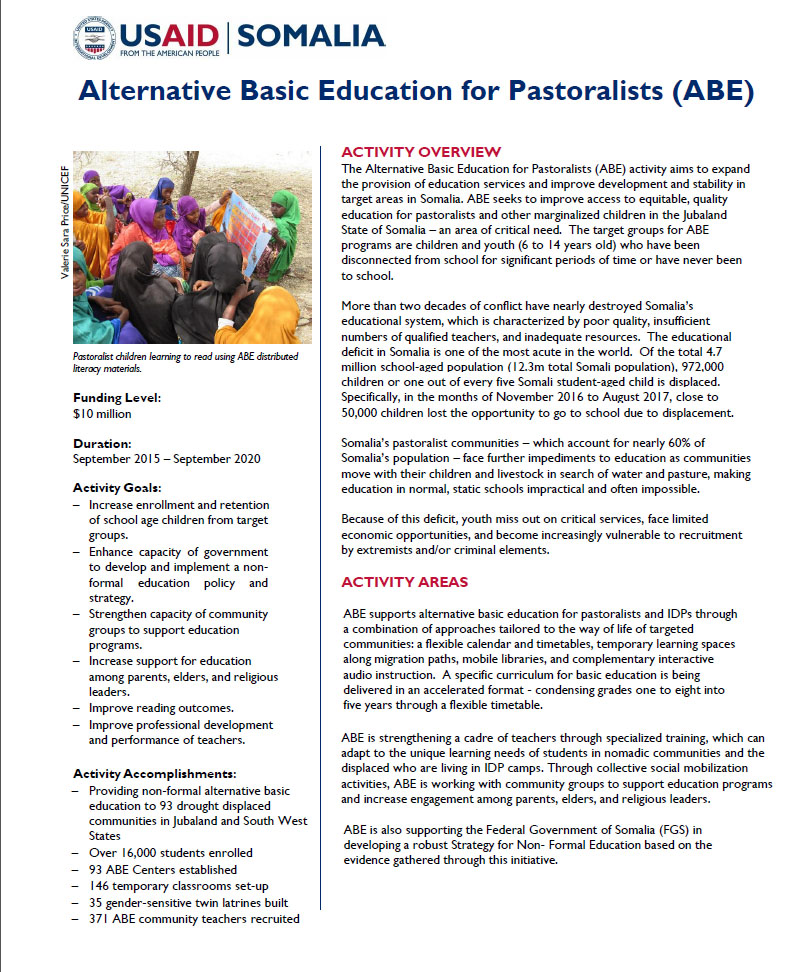Speeches Shim
![]() (236k) Fact Sheet - ABE
(236k) Fact Sheet - ABE
Activity Overview
The Alternative Basic Education for Pastoralists (ABE) program aims to expand the provision of education services and improve development and stability in targeted areas in Somalia. ABE seeks to improve access to equitable, quality education for pastoralists and other marginalized children in south-central Somalia – an area of critical need. ABE’s target groups are out-of-school children and youth (6 to 14 years old) who have been disconnected from school for significant periods of time or have never been to school.
More than two decades of conflict have nearly destroyed Somalia’s educational system, which is characterized by poor quality, insufficient numbers of qualified teachers, and inadequate resources. The educational deficit in Somalia is one of the most acute in the world. Of the total 4.9 million school-aged children (12.3m total Somali population), 3 million are not in school. From November 2016 to August 2017 alone, close to 50,000 children lost the opportunity to go to school due to displacement from drought.
Activity Areas
ABE supports alternative basic education for pastoralists and urban Internally Displaced Persons (IDPs) through a combination of approaches tailored to the way of life of targeted communities: a flexible calendar and timetables, temporary learning spaces along migration paths, mobile libraries, and complementary interactive audio instruction. A specific curriculum for basic education is being delivered in an accelerated format - condensing grades one to eight into four years.
ABE is strengthening a cadre of teachers through specialized training, which can adapt to the unique learning needs of students in nomadic communities and those living in IDP camps. Through collective social mobilization activities, ABE is working with community groups to support education programs and increase engagement among parents, elders, and religious leaders.
ABE is also supporting the Federal Government of Somalia (FGS) in developing a robust Strategy for Non- Formal Education based on the evidence gathered through this initiative.
Activity Impact
ABE is providing non-formal alternative basic education to communities in Baidoa (Bay), Bakool in South West State, and Gedo in Jubaland State, areas that were critically affected by the 2017 drought and have limited to no opportunity to access education.
Some 20,107 pastoralist and internally displaced children are now enrolled (8,647 girls) in 96 ABE Centers. New temporary learning classrooms have been constructed and equipped with educational supplies, including teaching and learning materials, chalkboards and desks, and sports and play equipment. To ensure girls’ consistent attendance and comfort, each center has separate gender-sensitive latrines and reusable sanitary towels are provided.
A total of 447 community teachers were trained in child-centered pedagogy. Most ABE teachers are ‘para-teachers’ from the community and sustained on-site training has proven to strengthen their knowledge and skills that enable them to deliver teaching in some of the most remote and difficult places in Somalia.
Social mobilization campaigns are underway to encourage parents to bring their children to school and actively participate in their education. A total of 672 Community Education Committee (CEC) members have received training in school development and maintenance planning, and are currently recruiting more children to attend school, and advocating for additional educational opportunities.
In collaboration with the Federal Ministry of Education, Culture and Higher Education and the Ministries of Education in South West and Jubaland States, ABE is implementing radio programing that will promote the ABE approach, identify other opportunities for learning, and encourage communities to provide feedback on air.
USAID supported the printing and distribution of almost 39,000 textbooks and other teaching and learning materials to all ABE centers. Classroom materials are in four subject areas: mathematics, environmental studies, Somali language, and Arabic and Islamic studies. Communities are currently participating in the development of literacy materials by providing traditional Somali stories, which will be included in books that promote positive and culturally inclusive messaging.
USAID partnered with local Somali NGO New Horizons to support Somali-led efforts to cultivate a culture of literacy. This included the flagship Mogadishu Book Fair in August 2019, which USAID has supported four years in a row; book forums in Baidoa and Abudwak; and writers’ and artists’ workshops in ABE-supported schools in Gedo, Bay, and Bakool.


Comment
Make a general inquiry or suggest an improvement.